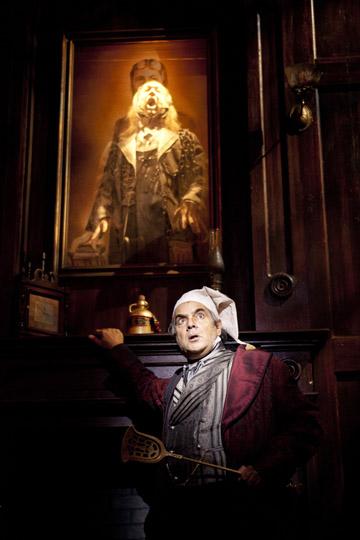Gero’s Take: Saving E. Scrooge Each and Every Christmas
By • December 7, 2012 0 1300

I think it’s getting into my DNA,” said Ed Gero, as we talked on the phone.
Gero, who’s been a vivid presence as an actor, teacher, performer and good theater citizen on the Washington scene since 1981, was talking about his fourth gig playing Ebenezer Scrooge at Ford’s Theater, the theater’s yearly contribution to Washington holiday traditions.
“Sure, it’s familiar, and it gets easier,” Gero said. “That doesn’t mean that you can sort of ease your way through it, that it doesn’t remain fresh. My family knows I’m one of the people that works during the Christmas holidays.”
“You know, we’re talking six days a week plus matinees, and the people always come from all over the country,” Gero said.
We were talking about Scrooges, references to Greek tragedy, Lear, and Joseph Campbell and the idea of the hero in humanity drift in natu- rally. Gero is one of these guys—doesn’t mat- ter whether the subject is, be it Mark Rothko, American art, the classics, Shakespeare, teaching theater—who’s a great talker and a good listener. Interviews, no matter what the length, end up being conversations.
“You always find new things in Scrooge,” Gero continued. “I mean Dickens is like Shake- speare in that sense. He creates enduring characters, and Scrooge is always present in our minds no matter how you do it.”
As for the character in question, Gero said: “He’s a man who’s lost his way. He’s losing his humanity. He’s incredibly lonely and a loner and so that’s how this journey—with the ghosts, in time—begins. It’s a journey of renewal, self-discovery. He’s come to this state entirely of his own mak- ing: he is the pitiless, all alone and bit- ter man he is because of the decisions he’s made. What’s true for Lear is true for Scrooge — and Oedipus Rex for that matter.”
Gero has played the Scrooge role four times. “I look forward to it each time,” he said
Here is an actor, who some- what later in his career has suddenly launched himself into the big roles, and Scrooge, no matter what you might say of its popularity, is a big, demanding piece of work.
At Arena last season, Gero commanded the stage in “Red,” a two-character play about the giant American Expressionist artist Mark Rothko, which he first performed at the Goodman Theater in Chicago before it was brought to Arena. Before that, Gero was an astonishing Gloucester in a Goodman production of “King Lear” (Stacey Keach was Lear) at the Shakespeare Theatre Company.
He’s done Richard Nixon, Solieri in “Amadeus,” Chekhov, Bolingbroke twice in “Richard II” at the Shakespeare Theatre Company. He was a haphazard and addled member of a group of drunken Irishmen in Martin McDonagh’s “The Seafarer.”
“You can’t get lazy just because you’ve done a part for a long time,” Gero said. “For one thing, we always haves children in the cast, and each year, they’re a different group. Sometimes, there’s a new Tiny Tim, as well as new actors. To them, it’s completely fresh. You can take some cures from that, plus it has the effect of making it new for you. There’s the added fact that there’s always a new audiences, a new group, new visi- tors, more kids and families. You’re keenly aware they’re out there and that to many of them, it’s a first time.”
Gero’s career in the D.C. area began in 1981 at the Barter Theater at George Mason University where he now teaches classical theater.
He has been a stalwart performer at the Shakespeare Theatre Company but also has been a regular at the Studio Theatre, where his work was more in the contemporary vein (“Skylight”, for which he won a Helen Hayes Award, “Shining City” and “American Buffalo, among many) and Round House Theatre.
His stage work has grounded him here where he’s raised a family and lives in Maryland with his wife Marijke, a special education teacher.
The Ford connection for Gero is getting deeper. He will take on the role of Horace Van- dergelder opposite Tony Nominee Nancy Opel as Dolly in the Ford’s Theatre production—co-produced with Signature Theatre—of “Hello Dolly” in March.
“It’s not a departure for me, and I’m really looking forward to it,” Gero said. “I’ve done ‘Sweeney Todd.’ So, I’m comfortable in a musical. Actually, I played the same part in a version of the Thornton Wilder play, “The Matchmaker.”
It’s another addition to what has by now be- come a hefty gallery of roles, getting larger, later.
We didn’t ask about Macbeth or Lear, which he has not done yet.
Nor did we ask whether he would do Scrooge again next year. It’s gotten so that it’s hard to imagine a Scrooge without Gero

